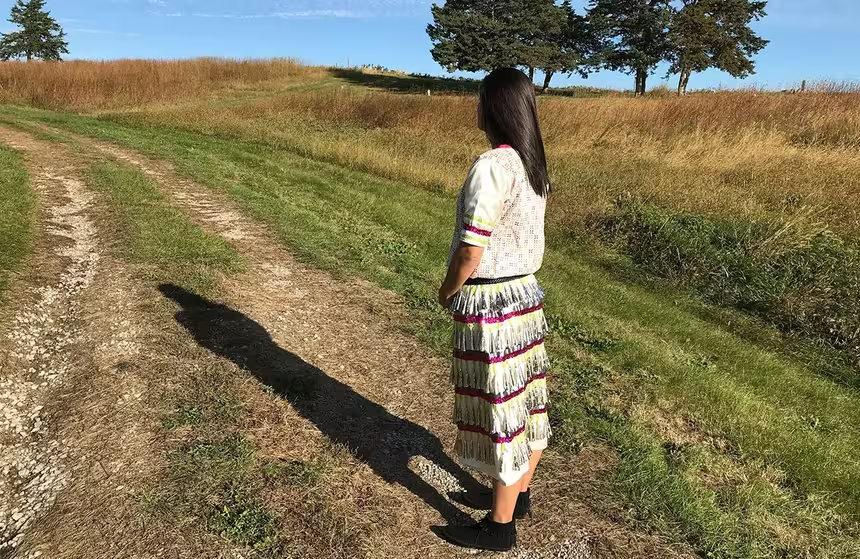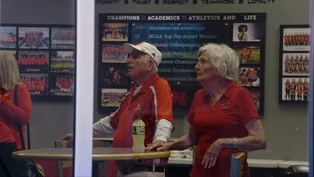
Willa Goes to Washington
Clip: Season 15 Episode 7 | 10m 25sVideo has Closed Captions
Willa Cather takes her place in National Statuary Hall.
A 7-foot bronze statue of writer Willa Cather is now on display at the US Capitol, one of two statues representing Nebraska in the National Statuary Hall collection. We see the dramatic unveiling, speak with sculptor Littleton Alston, who created the work, and explore Cather’s long journey from a Pulitzer Prize-winning writer who created a new vision of the American frontier to a towering statue.
Problems playing video? | Closed Captioning Feedback
Problems playing video? | Closed Captioning Feedback
Nebraska Stories is a local public television program presented by Nebraska Public Media

Willa Goes to Washington
Clip: Season 15 Episode 7 | 10m 25sVideo has Closed Captions
A 7-foot bronze statue of writer Willa Cather is now on display at the US Capitol, one of two statues representing Nebraska in the National Statuary Hall collection. We see the dramatic unveiling, speak with sculptor Littleton Alston, who created the work, and explore Cather’s long journey from a Pulitzer Prize-winning writer who created a new vision of the American frontier to a towering statue.
Problems playing video? | Closed Captioning Feedback
How to Watch Nebraska Stories
Nebraska Stories is available to stream on pbs.org and the free PBS App, available on iPhone, Apple TV, Android TV, Android smartphones, Amazon Fire TV, Amazon Fire Tablet, Roku, Samsung Smart TV, and Vizio.

Do you have a Nebraska Story?
Do you have a story that you think should be told on Nebraska Stories? Send an email with your story idea, your name, your city and an email address and/or phone number to nebraskastories@nebraskapublicmedia.org. Or, click the link below and submit your information on nebraskastories.org.Providing Support for PBS.org
Learn Moreabout PBS online sponsorship(Mozart's "Eine Kleine Nachtmusik") (Mozart's "Eine Kleine Nachtmusik") - [Littleton] And here we are walking to the Capitol, (Mozart's "Eine Kleine Nachtmusik") and it was a perfect day, it was beautiful, the sky was blue with clouds.
(Mozart's "Eine Kleine Nachtmusik") But we saw the dome and the fountains and all of it, and it was just entering this beautiful space.
(Mozart's "Eine Kleine Nachtmusik") It was just gorgeous.
(Mozart's "Eine Kleine Nachtmusik") When we walked through the main hall, the hall opened up, and there were photographers from all around the world there.
The place was packed.
(Mozart's "Eine Kleine Nachtmusik") - [Narrator] Sculptor Littleton Alston arrives in Statuary Hall, on the second floor of the US Capitol, on the most thrilling day of his professional career.
(announcer chatting) His seven foot bronze of Nebraska writer Willa Cathar.
-is hidden under cloth.
-(ethereal music) Today, she'll be unveiled for the world to see.
(ethereal music) - (Littleton) Her novels, her writing, her presence, her influence, (ethereal music) I think that's what makes her great.
(ethereal music) Telling a story about our nation, through her characters, (ethereal music) in a way that allows all of us, even today, -to connect, -(ethereal music) to feel a sense of connectedness to the past.
(ethereal music) We're nothing if we don't understand our past, we're nothing if we don't have artists who understand that.
(mob clamors) - [Narrator] What would Willa Cather think of the recent past when protestors stormed the US Capitol and moved through Statuary Hall on their way to challenge the US election?
(ethereal music) - [Reporter] Unbelievable.
We are televising the breach.
- [Reporter] Listen, you can't get through with a hairbrush that's metal, how do they get through with a flagpole?
- [Rioter] That's right, we own it.
We own you.
(ethereal music) - [Narrator] Two and a half years have passed, the physical evidence of the insurrection is gone, as Willa Cather prepares to take her place in Statuary Hall.
(ethereal music) (Attendees applaud) - [Kevin] I know you're excited, but I'm more excited, because this is the first statue I get to do as being speaker.
You know, every state sends two statues of extraordinary citizens to the US Capitol to represent them in Washington.
By law, the statues have to be made of bronze or marble.
(ethereal music) But make no mistake, the men and women we honor here are living symbols who represent our national memory, our patriotism, and our shared American creed, "E pluribus unum", out of many, one.
(ethereal music) - [Narrator] It was 2019 when Littleton Alston was chosen from among 70 artists to create a bronze of Nebraska's world famous author.
(ethereal music) He began by listening to her books and looking at her many portraits.
(ethereal music) - [Littleton] I look at each of the images and, just to sort of get a sense of her, but also just to make sure that, because I sculpt from the inside out, that everything is there.
So I'm not making a doll, I'm actually making a human form.
(gentle music) There are times when, when you're moving, when you're sculpting a form that's moving through space, (gentle music) there are a lot of dynamics going on.
You may not recognize it as just a viewer, but to the artist, there's a thousand things happening, and you're trying to orchestrate all of that.
And there are days in which I would go in and make changes, (gentle music) and think, oh, I've got it, oh yeah, that's it, (gentle music) and then I'd go home and come back in the morning and go, oh, no, that's not it.
(gentle music) That was the most frustrating.
(gentle music) (gentle music) - [Narrator] Alston unveiled the first version of his statue in Willa Cather's hometown of Red Cloud Nebraska.
(gentle music) - [Littleton] I look at the maquette as a poem, (gentle music) and then I look at the four-foot version as a short story.
And then the seven-foot, which will be in bronze, of Willa, in Statuary hall, will be the novel.
-(gentle music) -(Attendees applaud) - [Narrator] The next time he unveiled Willa Cathar in his Omaha studio, she had changed.
(gentle music) Members of the Willa Cather National Statuary Hall Selection Committee were impressed.
(gentle music) The poem has become the short story.
(gentle music) - [Littleton] I wanted to capture (gentle music) that wind surrounding her and her vision.
Also, I put in around her the memories of Nebraska, so there's the wagon wheel, and the arc of the wheel here, as well as here.
And then the cane, coming up with her pen, -and her writings.
-(uplifting music) So she's striding forward (uplifting music) into history.
(uplifting music) - [Ron] Now I like this better than, I liked that when I saw it in Red Cloud, but this is less matronly.
(uplifting music) And I like that, because she doesn't need to be portrayed matronly, (uplifting music) she needs to be alive, and I love the look on her face, like she is thinking and she is looking ahead, (uplifting music) it's quite moving.
(uplifting music) (gentle music) - [Narrator] Finally, at a foundry in Colorado, Alston supervises the finishing touches on his vision of Willa Cather.
The novel.
(gentle music) - [Littleton] It's like an adrenaline rush, (flames blowing) and it's beautiful to see it.
(flames blowing) The heat and the fire, and just the way in which it becomes almost a primal emergence of a form, doesn't it?
It's just astonishing.
It's almost like we're pulling it out of this cradle, right?
And it's just, you know, it's coming alive right in front of you.
(whimsical harp music) (whimsical harp music) - [Narrator] After that, Willa had to go into storage.
(whimsical harp music) She was ready, but Statuary Hall was not.
(whimsical harp music) -(indistinct chatter) -(cameras flash) It would be almost two years before Congress was prepared to dedicate another statute to the collection.
(whimsical harp music) By the time Willa Cather joined the Hall of Statues, it was the 150th anniversary of her birth.
(whimsical harp music) -- You ready?
-- Yep.
-- Okay.
Three, two, one.
-(whimsical music continues) (All applaud) - [Deb] Littleton, she is beautiful.
(applause) Willa is stepping forward, just like you told us she would.
Thank you.
Cather's vivid reflective writing has become synonymous with the pioneer spirit of Nebraska.
(gentle music) - [Narrator] Littleton Alston's bronze statue, on its granite pedestal, stands 10 feet tall and weighs nearly 1200 pounds.
(gentle music) The gold inscription on the front reads, "Nebraska, Willa Cather, author, 1873-1947," (gentle music) And as she wrote in her novel "O Pioneers!
", the history of every country begins in the heart of a man or a woman.
(gentle music) - [Littleton] There's a sense that a lot of things had come full circle, (gentle music) and I feel as though I've been lifted onto a carpet and just sort of flown around, - it was very beautiful.
-(gentle music) - [Narrator] Littleton Alston is the first African American to create a statue for the collection.
(gentle music) His Willa Cather replaces Jay Sterling Morton, founder of Arbor Day, who was also a fervent supporter of slavery.
(gentle music) Four years earlier, Nebraska replaced a bronze of orator and politician, William Jennings Bryan, with Chief Standing Bear of the Ponca Tribe, whose famous courtroom battle established Native Americans as persons under the law.
(gentle music) - [Littleton] I think Nebraska is more than you think.
(gentle music) I think the people of Nebraska are so diverse, (gentle music) and so independent, in so many ways, that you'll be surprised at what you'll find.
(gentle music) And I think that that's the great strength of Nebraska, (gentle music) we are capable of always accepting others who are on that journey in trying to find a home, (gentle music) and also inviting them into the home of Nebraska, and letting them understand and appreciate what it is -to be a part of this.
-(Crowd applauds) And I think on that day of the dedication, we were unified, all of us, and it was joyous.
(gentle music)
Video has Closed Captions
Clip: S15 Ep7 | 3m 30s | Football, family and love in Memorial Stadium. (3m 30s)
Providing Support for PBS.org
Learn Moreabout PBS online sponsorshipSupport for PBS provided by:
Nebraska Stories is a local public television program presented by Nebraska Public Media
















